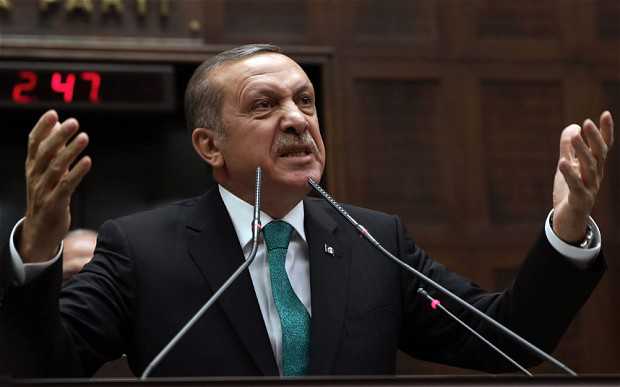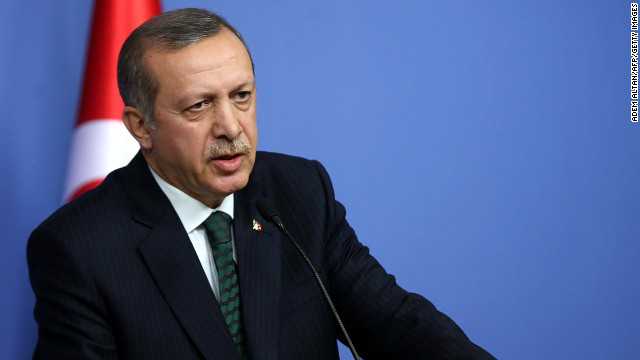|
By: Flynt Leverett & Hillary Mann Leverett |
|
| Turkey’s prime minister, Recep Tayyip Erdogan, was expected to come to the White House on Thursday for a meeting with President Barack Obama. Erdogan’s visit has now been postponed, and the decision to postpone comes on the heels of the Turkish leader’s high-profile visit to Iran this week.
When Erdogan does come to Washington, Obama would do well to listen to his Turkish visitor about the current state of play in the strategically vital Middle East. Erdogan will come to Washington not only at a time of strong domestic support for his government and the ruling Justice and Development Party, a moderate Islamist party that has dominated Turkish electoral politics in this decade, but also at a time of increasing influence for Turkey in the broader Middle East — while America’s influence in the region continues to decline. Turkey is, of course, a member of NATO and has long had a positive economic and strategic relationship with Israel. But, working from these four principles, the Erdogan government has in recent years effected major improvements in Turkey’s relations with a much wider range of Middle Eastern states, including Iran, Iraq and Syria. This opening to the broader Middle East has been very strongly in Turkey’s interest. Expanding trade and investment links to Iran, Iraq, Syria and other regional states has boosted the growth of Turkey’s economy and reinforced its status as an “emerging market” of international significance. Moreover, closer ties to Middle Eastern countries, along with links to Hamas and Hezbollah, have made Ankara an increasingly important player across a wide spectrum of regional issues. Erdogan wants to position Turkey to act as a mediator between its Muslim neighbors and the West — including the United States, which needs to move beyond nice speeches by Obama and undertake concrete diplomatic initiatives to repair its standing in the Middle East. But if Washington is too shortsighted to see the necessity of realigning its relations with key Middle Eastern actors such as Iran, the Erdogan government’s opening to the broader Middle East gives Ankara a wider array of strategic options for pursuing Turkish interests — the essence of successful diplomacy. During his visit to Tehran this week, Erdogan met with Supreme Leader Ali Khamenei — a rare honor for a foreign leader. (In 2007, Russia’s then-President Vladimir Putin was also accorded a meeting with Khamenei.) Turkey’s expanding ties to the Islamic republic — including gas supply contracts and preliminary agreements for major upstream and pipeline investment projects — are essential to consolidating Turkey’s role as the leading transit “hub” for oil and gas supplies to Europe. While in Iran, Erdogan said that he hopes Turkish-Iranian trade — currently valued at roughly $10 billion — will double by 2011 and strongly supported Iranian participation in the Nabucco gas pipeline. Meeting with Iranian President Mahmoud Ahmadinejad, Erdogan criticized international pressure on Tehran over its nuclear activities as “unjust and unfair” while other states maintain nuclear weapons. Israelis and some of Israel’s friends in the United States decry what they see as the expansion of Turkey’s ties to other important Middle Eastern states at the expense of Turkey’s ties to Israel. Ankara has indeed been sharply critical of Israel’s military campaign in Gaza and its role in the continuing humanitarian crisis there — a posture manifested in Erdogan’s highly publicized walkout from a joint event with Israeli President Shimon Peres at the World Economic Forum and the postponement of NATO military exercises in Turkey that would have included Israeli forces. But criticism of Turkey from pro-Israel circles misses an important reality: At this point, Israel arguably needs a relationship with Turkey more than Turkey needs a relationship with Israel. Flynt Leverett directs the New America Foundation’s Iran Project and teaches international affairs at Penn State. Hillary Mann Leverett is CEO of Stratega, a political risk consultancy. |
|
| © 2009 Capitol News Company, LLC | |
-

-
- Stephen Kinzer
- guardian.co.uk, Tuesday 27 October 2009 17.00 GMT
- Article history
This week’s visit to Iran by the Turkish prime minister, Recep Tayyip Erdoğan, is to be warmly welcomed. Turkey is playing a highly positive new role in the Middle East. It seeks to be a conciliator, a mediator, a peacemaker. Reaching out to Iran is an ideal way for it to play this role.
Turkish leaders have spent several years pursuing a goal they call “zero problems with neighbours“. They have been highly successful. Turkey is on good terms with Greece, Bulgaria and Iraq. As for Syria, with which it almost went to war a decade ago, visa requirements have been abolished, and foreign minister Ahmet Davutoğlu asserted in Aleppo earlier this month that the two countries share “a joint destiny, a joint history and a joint future”. This came just days after Turkey’s highly promising breakthrough with Armenia, under which their border is to be reopened and diplomatic relations restored after a 16-year break.
Now Turkey is moving to a second, even more ambitious stage of its regional policy: “no problems between neighbours.” Its leaders realise that Turkey’s future prospects depend on regional stability, and are actively seeking to resolve disputes in the neighbourhood. Because of its size, its economic power, its history and its well-developed though still incomplete democracy, Turkey is uniquely placed to be both a model and a broker.
For most of Turkey’s modern history, the Muslim world has seen it as an apostate. Atatürk’s reforms pulled it so far from Islam that it seemed to have no religious legitimacy. Besides, it was perceived as Washington’s lackey, stigmatised by its embrace of American policies that many Muslims found abhorrent.
Neither of those objections applies to Turkey today. It is governed by pious Muslims and has its own foreign policy. Its leaders are warmly welcomed in many places where, in the past, they would not even have cared to visit.
Under other circumstances, Egypt, Pakistan or Iran might have emerged to lead the Muslim world. Their societies, however, are weak, fragmented and decomposing. Indonesia is a more promising candidate, but it has no historic tradition of leadership and is far from the centre of Muslim crises. That leaves Turkey – which, by happy coincidence, is eager to play this role.
One dark spot, however, has emerged to blot this happy picture. Turkey has begun to distance itself from Israel. This month it cancelled its participation in a joint military manoeuvre with the Israeli defence forces. Its leaders speak out angrily against Israeli policies – most notably prime minister Erdoğan, who at this year’s Davos conference denounced Israel’s invasion of Gaza as a “crime against humanity”. One of the region’s most important relationships is fraying.
Turkish leaders are allowing emotion to affect their attitude toward Israel. They are understandably angry over Israeli misdeeds. If Turkey is to be a bridge among nations, though, it cannot afford gratuitously to alienate any. The United States has brought itself much grief by isolating Iran; it would be just as foolish for Turkey to reject Israel.
Like Iran, Israel is a pariah in many circles, and is frozen out of Middle East security arrangements. This is bad for all parties. Pushing Israel into a corner, or making Israel feel that it is alone and friendless, does not serve the cause of peace.
Turkey has a history of excellent relations with Jews, and was one of the first countries to recognise Israel. Turning its back on that legacy, as it has apparently begun to do, contradicts its new diplomatic role as a broker of compromise. The contribution Turkey can make by playing that role is far greater than the feel-good effect of lashing out emotionally at Israel’s excesses.
For Turkey to strengthen ties with Iran is good – as long as it does not turn its back on the United States. For it to cultivate relations with Hamas and Hezbollah is also good – but not if it breaks with Israel. Turkey shows unique promise as a regional peacemaker. To play that role, however, it must follow a cardinal rule that the US has for years ignored: shape foreign policy according to national interest, not emotion.









